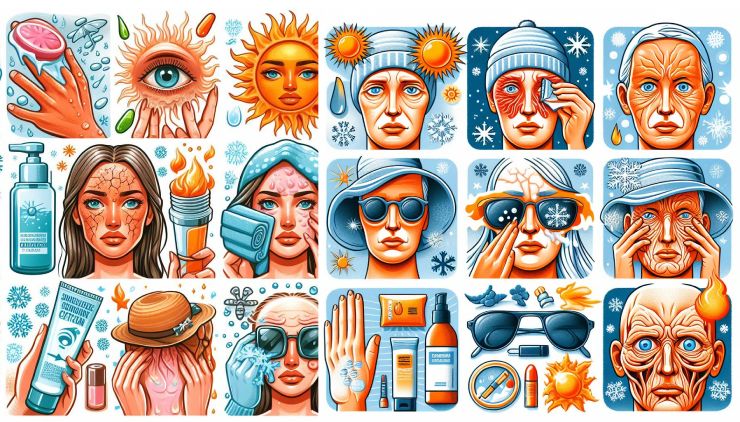Winter often brings to mind cozy scenes, snow-covered landscapes, and crisp, chilly air. While sunlight may not be as intense as in the summer, it still holds the potential to impact our well-being. Contrary to common belief, winter sunlight is not always benign; it can have harmful effects on our skin, eyes, and overall health. Let’s delve into the shadows cast by the winter sun and explore how to protect ourselves from its unseen dangers.
1. Skin Damage: The Silent Winter Threat
Winter sun, though less glaring, can be deceiving when it comes to skin damage. The cold weather may tempt us to spend more time outdoors, and the sun’s UV rays can still penetrate the skin, leading to premature aging and an increased risk of skin cancer. It’s crucial to maintain good sun protection habits, even when temperatures drop.
2. Dehydration: The Winter Sun’s Stealth Assault
The combination of cold air and exposure to sunlight can lead to dehydration, as the body may not signal the need for hydration as clearly as it does in warmer weather. Dry air and cold winds can sap moisture from the skin, leaving it parched and susceptible to damage. Staying well-hydrated becomes essential to counteract the subtle dehydration caused by the winter sun.
3. Eye Strain and Glare: Navigating the Winter Sun’s Brightness
The low angle of the winter sun can create intense glare, particularly when it reflects off snow-covered surfaces. This glare poses risks of eye strain, discomfort, and potential damage to the eyes. Wearing sunglasses with UV protection becomes imperative to shield the eyes from harmful rays and reduce the risk of conditions like snow blindness.
4. Vitamin D Deficiency: Balancing the Benefits and Risks
While sunlight is a natural source of vitamin D, the reduced exposure during winter can contribute to deficiencies. Vitamin D plays a crucial role in maintaining bone health, immune function, and mood regulation. Striking a balance between obtaining sufficient vitamin D and protecting oneself from the sun’s harmful effects requires thoughtful consideration and, if necessary, dietary supplementation.
5. Seasonal Affective Disorder (SAD): The Winter Blues Amplified
The winter sun, or rather the lack of it, can impact mental health. Seasonal Affective Disorder (SAD) is a type of depression that occurs seasonally, often in the winter months. Reduced exposure to sunlight can disrupt the body’s internal clock and affect mood-regulating neurotransmitters. Ensuring adequate exposure to natural light and seeking professional help when needed are crucial steps in managing SAD.
6. Snow Reflection: A Winter Sun Double Whammy

Snow-covered surfaces can act as natural reflectors, intensifying the impact of the winter sun. This reflection increases UV exposure, making it imperative to apply sunscreen on exposed skin, even on seemingly overcast days. Failure to protect against snow glare can result in sunburn and long-term skin damage.
7. Cold Sores: Winter Sun Sparks Outbreaks
For those prone to cold sores, the winter sun can be a trigger. Exposure to sunlight, combined with the stress commonly associated with the holiday season, can activate the herpes simplex virus, leading to painful and unsightly outbreaks. Applying lip balm with SPF and managing stress levels become essential preventive measures.
8. Colder Temperatures, Lower Immunity: A Sunlit Paradox
Prolonged exposure to cold temperatures can suppress the immune system. While the winter sun may provide some mood-boosting benefits, spending excessive time outdoors without proper protection can compromise the body’s ability to fight off infections. Maintaining a balance between enjoying the winter sun and protecting oneself from its adverse effects is key.
Conclusion:
Navigating the Winter Sun’s Delicate Dance
As we embrace the winter season, it’s crucial to be mindful of the not-so-innocent effects of the winter sun. From skin damage to subtle dehydration and the risk of seasonal affective disorder, the cold-weather sun requires our attention and proactive care. By adopting simple yet effective measures, such as wearing sunscreen, staying hydrated, and managing exposure, we can revel in the beauty of winter without falling prey to its unseen dangers.
Winter sun, though gentle in appearance, demands our respect. So, as you enjoy the serene landscapes and frosty air, remember to shield yourself from the subtle harm that the winter sun can bring



